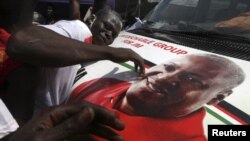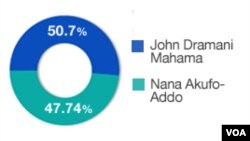The president of the ECOWAS commission says he is pleased with the organization and conduct of voters during Ghana’s elections.
Ambassador Kadre Desire Ouedraogo commended the Independent Electoral Commission (INEC), the political parties and the people of Ghana for what he says was a peaceful vote.
His comments came after the Independent Electoral Commission (INEC) confirmed incumbent President John Mahama has been elected to his first full term in office. He was closely followed by main opposition challenger Nana Addo Dankwa Akufo-Addo.
The opposition New Patriotic Party claimed the vote was marred by fraud.
But Ouedraogo said, “Overall, everything went relatively well. And I must commend [the] Ghanaian people, the political parties and also all the voters for their sense of discipline and also the peaceful nature of this election.”
“I have observed that there was a strong enthusiasm from all parties around this election and from the polling stations we visited, we were encouraging for democracy in Ghana,” continued Ouedraogo.
Ouedraogo, who was a leading member of the ECOWAS poll observer group that monitored the election, said the electoral body swiftly resolved concerns of late voting and breakdowns of the new biometric verification machines. The breakdown of the machines subsequently led to delays and an extension of voting to Saturday.
“They had given instructions that the batteries of all these identification machines should be changed very five hours, but unfortunately, this instruction was not followed by everyone,” continued Ouedraogo, “I think that it was lack of communication. They should sensitize more the presiding officers of the polling stations, and we could have avoided these incidents.”
Ouedraogo called on the electoral commission to take proactive measures to address the breakdown of the machines for future elections.
“The recommendation we are making is that maybe in the future, use the voters’ list for identification. As long as you have a photograph of the voter and you have all his particulars, I believe that this can be a safe way for identification,” said Ouedraogo.
The political parties, Ouedraogo said, unanimously agreed to the strict use of the biometric verification machines.
“The fact that they said that no identification by machine, no vote, is a collective decision by all parties so that we respect this decision and we believe also that there is a more viable way to identify voters, but sometimes you cannot trust [machines] so you have to live with it. But I think this is a lesson learn[ed] for future elections,” said Ouedraogo.
He said Ghana’s election should be an example to countries in the West African region.
Ambassador Kadre Desire Ouedraogo commended the Independent Electoral Commission (INEC), the political parties and the people of Ghana for what he says was a peaceful vote.
His comments came after the Independent Electoral Commission (INEC) confirmed incumbent President John Mahama has been elected to his first full term in office. He was closely followed by main opposition challenger Nana Addo Dankwa Akufo-Addo.
The opposition New Patriotic Party claimed the vote was marred by fraud.
But Ouedraogo said, “Overall, everything went relatively well. And I must commend [the] Ghanaian people, the political parties and also all the voters for their sense of discipline and also the peaceful nature of this election.”
“I have observed that there was a strong enthusiasm from all parties around this election and from the polling stations we visited, we were encouraging for democracy in Ghana,” continued Ouedraogo.
Ouedraogo, who was a leading member of the ECOWAS poll observer group that monitored the election, said the electoral body swiftly resolved concerns of late voting and breakdowns of the new biometric verification machines. The breakdown of the machines subsequently led to delays and an extension of voting to Saturday.
“They had given instructions that the batteries of all these identification machines should be changed very five hours, but unfortunately, this instruction was not followed by everyone,” continued Ouedraogo, “I think that it was lack of communication. They should sensitize more the presiding officers of the polling stations, and we could have avoided these incidents.”
Ouedraogo called on the electoral commission to take proactive measures to address the breakdown of the machines for future elections.
“The recommendation we are making is that maybe in the future, use the voters’ list for identification. As long as you have a photograph of the voter and you have all his particulars, I believe that this can be a safe way for identification,” said Ouedraogo.
The political parties, Ouedraogo said, unanimously agreed to the strict use of the biometric verification machines.
“The fact that they said that no identification by machine, no vote, is a collective decision by all parties so that we respect this decision and we believe also that there is a more viable way to identify voters, but sometimes you cannot trust [machines] so you have to live with it. But I think this is a lesson learn[ed] for future elections,” said Ouedraogo.
He said Ghana’s election should be an example to countries in the West African region.







